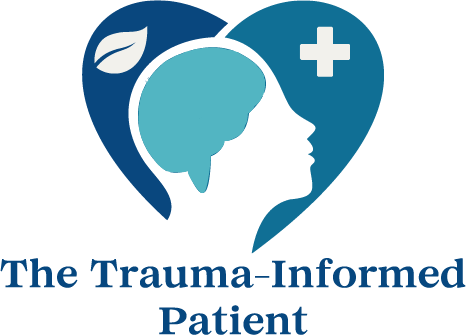The Trauma-Informed Patient

Informational Resource For
Medical Trauma
It’s time for the medical system to understand that medical treatment can sometimes be traumatic. Whether it’s a harrowing birth, a heart attack, a severe accident, or a life-changing medical diagnosis; these events can all lead to medical trauma.
If you’re feeling like you’re losing control or you haven’t been the same since your medical experience, know that you’re not alone. Medical Trauma is real and more people are talking about it.
However, there aren’t many resources out there specifically for patients that focus on educating about medical trauma, helping navigate the healthcare system, and advocating for high-quality, trauma-informed care. That’s where The Trauma-Informed Patient comes in.

Colleen Lee
Colleen Lee, PMHNP-BC
The Trauma-Informed Patient
Founder
When we talk about medical trauma, what does thatmean exactly?
Medical trauma happens when people feel upset and emotional because of their experiences in the healthcare system.
It can happen when they go through complex medical procedures, get bad health news, face mistakes in medical care, or have complicated interactions with healthcare providers.
Medical trauma can also come from feelings of being helpless, scared, not having control, or not getting enough support during medical events.

Each Person Is Different
After a traumatic medical event, people may have ongoing procedures, need follow-up appointments, and have to make changes in their lifestyle, diet, appearance, or abilities, which can all add to their level of trauma.
It’s worth noting that medical trauma can be different for each person since everyone’s experiences and feelings are personal.
Challenges
Medical trauma can become worse when people have to deal with challenges in our complicated medical system. This can include
- calling healthcare providers multiple times without getting responses
- not getting all their questions answered
- facing issues with insurance coverage
- dealing with unhelpful staff
- experiencing medical gaslighting
All of these factors can make medical trauma more challenging to manage.
How An Individual Experiences Trauma
If someone feels that a medical event was traumatic for them, then it is considered trauma for that person.
What is the difference between medical trauma and medical anxiety?
Medical anxiety and medical trauma are similar in that they both involve fear and distress related to healthcare, but there are some key differences.
Medical trauma usually leads to a more severe and longer-lasting emotional reaction from traumatic medical events,which can include developing depression and Post Traumatic Stress Disorder (PTSD).
Medical trauma and medical anxietycan be helped with the proper support, empathy, and customized strategies to help individuals manage their experiences and navigate the healthcare system successfully.
WHO IS AT RISK?
To Get Medical Trauma
Humans are complex and have different interactions with the medical system. That’s why people experience medical trauma in different ways. Here are some common reasons why medical trauma might develop:
Past Traumatic Experiences
People who have had bad or traumatic experiences in healthcare, like mistakes, poor treatment, or emergencies, are more at risk of medical trauma.
Severity of Illness or Injury
Serious medical conditions, long hospital stays, invasive procedures, or life-threatening situations can increase stress and trauma reactions.
Feeling Helpless
Feeling like you have no control, not being involved in decisions, or losing autonomy in medical settings can make trauma feelings worse.
Trigger Sensitivity
Some people may be more sensitive to certain stimuli, healthcare environments, or reminders of past trauma, making them more vulnerable to medical trauma.
Mental Health Conditions
Existing conditions like anxiety, depression, PTSD, or previous trauma can make someone more vulnerable to medical trauma.
Lack of Support
Not having enough social support, feeling isolated, or being misunderstood or ignored by healthcare providers can make someone feel more helpless and distressed during medical events.
Communication Issues
Poor communication with healthcare providers, not getting enough information about treatments, or feeling like your concerns are not heard can lead to more emotional distress.
Cultural or Social Factors
Discrimination, cultural beliefs, language barriers, or past negative experiences in healthcare can also affect how vulnerable someone is to medical trauma.
WHAT ARE THE SYMPTOMS
of medical trauma
The symptoms of medical trauma are the common traumatic stress symptoms, usually how the body responds to the trauma experienced in a medical setting.
These responses can be influenced by past traumatic experiences, coping mechanisms, support systems, and the current medical situation.
It’s important to recognize these symptoms and seek support if you or someone you know is dealing with medical trauma. Support and understanding can make a significant difference in coping and recovery from these challenging experiences.
�
Hypervigilance
Feeling anxious, fearful, or uncomfortable in medical environments.
Emotional Dysregulation
Struggling to control emotions, leading to strong reactions like anger, sadness, or feeling emotionally numb during medical situations.
Avoidance of Medical Care
Avoiding seeking medical help or discussing health concerns due to trauma-related fears.
Physical Symptoms of Stress
Experiencing physical symptoms like headaches, stomach issues, or sleep problems due to anxiety and stress.
Mistrust of the Healthcare System
Developing a lack of trust or confidence in healthcare providers or the healthcare system.
Intrusive Memories or Nightmares
Experiencing distressing memories or nightmares related to medical experiences.
Flashbacks
Re-living past traumatic events during medical procedures that trigger memories or intense emotions.
Mood Changes
Developing depression or persistent feelings of sadness or hopelessness.
Dissociation
Feeling disconnected from reality as a coping mechanism during distressing medical encounters, affecting memory, emotions, and perception.
Social Withdrawal
Withdrawing from social interactions or activities due to the emotional impact of medical trauma.
There is hope!
VARIOUS TREATMENTS AVAILABLE
Treating medical trauma involves addressing the emotional and psychological impact of difficult medical experiences. Here are some ways to help with medical trauma:�
Therapy
Specialized therapies like Eye Movement Desensitization and Reprocessing (EMDR) or Trauma-Focused Cognitive Behavioral Therapy (TF-CBT) can help process emotions and reactions related to medical trauma.
Support Groups
Joining support groups with others who have faced medical trauma can offer validation, connection, and understanding.
Education
Learning more about the effects of medical trauma and developing coping strategies can empower individuals to manage their emotions. Follow TTIP on social media for more education!
Medication
Sometimes, medication is prescribed to manage symptoms of anxiety, depression, or PTSD linked to medical trauma.
Self-Care
Engaging in self-care activities like exercise, mindfulness, and relaxation techniques can reduce stress and improve well-being.
Advocacy
Working with patient advocates or support organizations can help navigate the healthcare system, address concerns, and advocate for your rights to prevent further trauma.
Building Trust
Developing a trusting relationship with healthcare providers who understand your medical trauma can enhance comfort and communication during medical visits.
